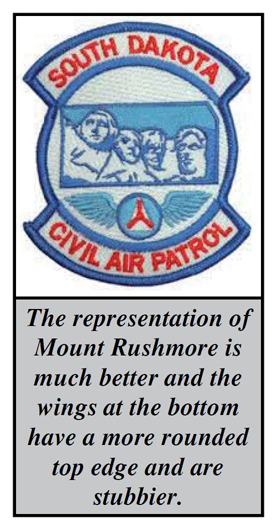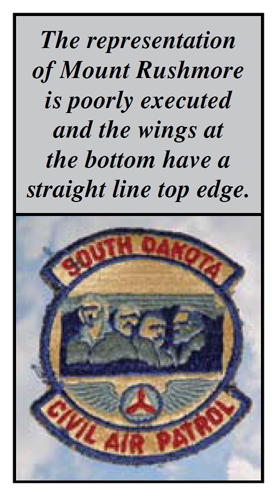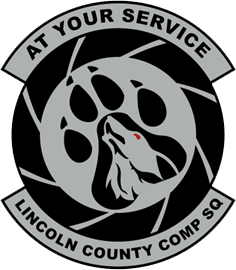



Information provided by:
Article originally publised in the Spring 2017 edition of SD Wing Roundup.


The 2005 National Cadet Competition took place July 6 through July 11 at the Steven F. Udvar-Hazy Center, the Smithsonian National Air and Space Museum's annex at Washington Dulles International Airport in Washington, DC. South Dakota Wing's "1st Cav" Drill Team represnted North Central Region in the National Drill Team Competition.
TOP PHOTO - Standing left to right is: Cadet Bojan Salihagic, Sioux Falls Comp; Cadet Dan Campbell, Crazy Horse Comp Sq; Cadet Eric Wahl, Rushmore Comp Sq; Cadet Ann Ziegler, Lookout Mountain Comp Sq; Cadet Ben Larson, Sioux Falls Comp Sq; Cadet Susanna Marking, Crazy Horse Comp Sq; Cadet Libby Marking, Crazy Horse Comp Sq; Cadet Sarah Adams, Lookout Mountain Comp Sq; Cadet Cody Silvernagle, Lookout Mountain Comp Sq; Cadet Tyler Baldwin, Rushmore Comp Sq (at back); Cadet A J Betzler, Sioux Falls Comp Sq; Cadet Wesley Biggs, Sioux Falls Comp Sq; Cadet Peter Coates, Sioux Falls Comp Sq; Cadet Alex Ingalls, Rushmore Comp Sq; and Col B T Marking, South Dakota Wing Commander. Kneeling left to right are: Cadet J T Claymore, Crazy Horse Comp Sq; 1st Lt Mike Johnson, Rushmore Comp Sq; 2d Lt Beth Hermanson, Lookout Mountain Comp Sq; and Maj Vicky Marking (taking photo).
The 2007 National Cadet Competition took place June 28 through July 1 at the National Museum of the United States Air Force in Daytom, Ohio. South Dakota's "1st Cav" Drill Team (bottom photo) once again represnted North Central Region in the National Drill Team Competition.
BOTTOM PHOTO - Roughly from left to right is: Cadet A J Betzler, Sioux Falls Comp Sq; Cadet Natalie Krueger, Big Sioux Comp Sq; Cadet Cory Chastain, Rushmore Comp Sq; Cadet Nick Gengler, Big Sioux Comp Sq; Cadet Libby Marking, Crazy Horse Comp Sq; C/Col Susanna Marking, Big Sioux Comp Sq (Commander); Cadet Cory Mergen, Rushmore Comp Sq; Cadet Francesca Fogarty, Sioux Falls Comp Sq; Cadet Hanna Krueger, Big Sioux Comp Sq; Cadet Ryan Maendel, Rushmore Comp Sq; Cadet Wesley Biggs, Sioux Falls Comp Sq; Cadet Jesse Bicknell, Lewis and Clark Comp Sq; Cadet Tyler Baldwin, Rushmore Comp Sq; Cadet Ben Jared, Lewis and Clark Comp Sq (Alternate, not shown); Lt Col B T Marking (Escort, not shown); Lt Col Cindi Merchant (Escort, not shown); Maj Vicky Marking (Escort, not shown); and 1st Lt Ed Jared (Escort, not shown).
Information provided by:
Major Karla West,
South Dakota Wing Historian
March 4, 2024

 The Wolf: The "Lobos" mascot holds a special place in the hearts of our squadron, serving as a symbol of strength, unity and determination. The wolf, or "lobo", emphasizes the qualities we embrace; fierce loyalty, keen instincts and an unyielding spirit. The "Lobo’s" mascot is not copyrighted allowing us to celebrate this emblem of fortitude and teamwork.
The Wolf: The "Lobos" mascot holds a special place in the hearts of our squadron, serving as a symbol of strength, unity and determination. The wolf, or "lobo", emphasizes the qualities we embrace; fierce loyalty, keen instincts and an unyielding spirit. The "Lobo’s" mascot is not copyrighted allowing us to celebrate this emblem of fortitude and teamwork.
The Paw Print: The wolf’s paw print symbolizes the lasting impact we aim to create through our actions. It signifies the positive imprints we leave behind when our mission is complete. Whether through acts of kindness, community service or leadership, these prints are tangible outcomes of our dedication and hard work.
The Camera Shutter: The camera shutter is a fundamental element in photography. Whether in aerial photography from our planes or small Unmanned Aerial Systems (sUAS), the camera shutter is pivotal in capturing sharp, detailed images from high altitudes or during fast movements. Our Ground Teams rely on the same precision from our handheld cameras to document and analyze situations.
Our Motto: "At Your Service" embodies the spirit of dedication and selflessness that defines the volunteers of our squadron and Civil Air Patrol. The motto reflects the commitment to serving our community, state and nation with a servant’s heart.
Our Colors: The choices of black, silver/gray and red for our squadron reflects a thoughtful and powerful representation of your values. Black, as a color of efficiency, signifies the precision and dedication with which our squadron operates. Silver/gray, representing strength, is a fitting choice to symbolize the resilience and the mental and physical fortitude of our members. Red, the color of passion, captures the fiery dedication and enthusiasm that drives each of us and stands as a visual testament to the efficiency, strength and passion that define our organization.
Information provided by:
Capt Denise Clement, Squadron Commander
June 19, 2024

History & Heraldry
The Rushmore Comp Sq Squadron, CAP designation NCR-SD-031, is located on Ellsworth Air Force Base in Rapid City, SD. It is one of six squadrons in the South Dakota Wing.
The squadron is named after the Shrine of Democracy, commonly known as the Mt. Rushmore monument, an iconic symbol of South Dakota. As the Rushmore Comp Sq Squadron is located on Ellsworth AFB, home to one of the U.S. Air Force units equipped with the B-1 bomber, the squadron’s patch blends elements of both into its design.
The squadron’s distinctive unit patch is in the traditional round shape and consists of two rings and a central medallion. The narrow outer ring is black. The wide inner ring is red. At the top center of the red ring is an abbreviated form of the squadron’s CAP designation in white. Below, and to the right and left are two white stars that symbolize the Civil Air Patrol’s mission of aerospace education. Around the base of the red ring is the squadron’s name in white. The central medallion depicts a black and grey U.S. Air Force B-1 bomber trailing white contrails as it soars through the dark blue South Dakota sky. Below the bomber is a depiction of Mount Rushmore in light blue and white with scattered trees in black at the base and sides of the monument.
No record has been found that mentions who designed the patch, when it was designed, or when it was approved for wear on CAP uniforms.
Information provided by:
Major Karla West,
South Dakota Wing Historian
February 22, 2024


ELEMENT ONE
Mount Rushmore - Mt Rushmore represents the greatness of our nation in that the four presidents on Mt Rushmore were picked for their great leadership. George Washington for being our first president, Thomas Jefferson for being the primary author of the Declaration of Independence, Theodore Roosevelt for provided leadership when America experienced Rapid economic growth, and Abraham Lincoln for holding the nation together during the civil war. We take our squadron name from this cherished monument since it represents the values Integrity, Volunteer service, Excellence, and Respect.
ELEMENT TWO
Trees - Black Hills - The Evergreen trees represent our location which is in the Black Hills of South Dakota. The dense forests created a dark hue against the skyline, rendering the hills black. The name Black Hills is a translation of the Lakota Paha Sapa, which literally means "hills that are black".
ELEMENT THREE
The Wolfpack - The wolfpack represents a strong sense of unity and teamwork in a unit demonstrating cooperation and support for each other. The wolfpack must work in unison to accomplish tasks and follow their leaders with trust and distinction.
Moon and Wolves Howling at it - The primary reason wolves howl is a rally cry for the troops to meet up and a signal to let all members know we are on station. The moon represent that we are always ready day or night to execute our mission.
Lightning bolts - The lightning bolt is a symbol of power, strength, energy, and speed. The lightning bolt is most widely associated with the Greek God Zeus and the Norse God Thor. The lightning bolt is also associated with Thors protection of humanity. Lightning also has a positive side in that it is often seen as a sign of hope and change, especially when it comes after a period of darkness just like a find in a Search and rescue mission.
Information provided by:
Lt Col Howard Steiner, Commander
Rushmore Composite Squadron
April 1, 2024

History & Heraldry
The Sioux Falls Cadet Squadron was located in Sioux Falls, SD. The squadron is believed to have been one of the oldest in the South Dakota Wing having been formed around 1945, but possibly as early as 1942. It existed until 2001.
From 1986-2001, there were two CAP squadrons in Sioux Falls; the Sioux Falls Cadet Squadron (SD-050) that existed from the early 1940s to 2001 and the Joe Foss Senior Squadron (SD-061) that existed from 1986-2001. In 2001, the Joe Foss Senior Squadron merged with the Sioux Falls Cadet Squadron to form the Sioux Falls Comp Sq Squadron (SD-050). When the units merged this patch was inactivated and replaced by the new Sioux Falls Comp Sq Squadron patch.
The Sioux Falls Cadet Squadron’s distinctive unit patch is in the traditional shape of a circle with banners at top and bottom. The banners bear the name of the squadron in green on a white field. The entire patch is outlined in black. The patch consists of a round white field bearing a large yellow sunburst. In the center of the sunburst is a brown eagle with white tail feathers and head. It is a patriotic image and alludes to the link between the US Air Force and the Civil Air Patrol, its official volunteer civilian auxiliary. Clutched in the eagle’s claws is an older version of the Civil Air Patrol Cadet Programs badge. The badge is in the shape of a shield. The top third of the shied is a blue field with white stars. The bottom two thirds of the shield are alternating vertical red and white stripes. In the center of the badge is a large, white three-blade aircraft propeller.
Lt Col Steward Evans, former Executive Officer of the Sioux Falls Cadet Squadron, confirmed that the patch is valid and that it was designed by the cadets of the squadron, but he does not recall when.
Information provided by:
Major Karla West,
South Dakota Wing Historian
February 22, 2024

History & Heraldry
The Sioux Falls Comp Sq Squadron, CAP designation NCR-SD-050, is located in Sioux Falls, SD. It is one of six squadrons in the South Dakota Wing.
The squadron is named after the city where it is located. The squadron is one of the oldest in the South Dakota Wing and can document its lineage to 1950 and, anecdotally to 1942, when it was the location of one of the eight Area Group Commands in the South Dakota Wing.
The squadron’s distinctive unit patch is in the traditional shape of a shield with a scroll at the bottom bearing an abbreviated form of the squadron’s name. The patch is outlined in white. At the top of the shield is a horizontal black bar bearing the Civil Air Patrol motto "Vigilant Always" in Latin in white. Below the black bar is a nose-on view of a Cessna aircraft in Civil Air Patrol colors flying through the vivid hues of a South Dakota evening. Below the aircraft is an abbreviated form of the squadron’s CAP designator. Horizontally, just below the center of the shield is a depiction of the Sioux Falls skyline. The brown and blue area below the skyline represents the waterfall on the Sioux River. At the bottom of the shield is a composite of an older version of the Civil Air Patrol’s winged logo over stylized Air Force style wings. This symbolizes that the Civil Air Patrol is the official auxiliary of the US Air Force.
The squadron patch was designed in 2006 by Lt Col Rick Larson and the then Squadron Public Affairs Officer Lt Shawn Anderson. It was approved for wear shortly thereafter.
Information provided by:
Major Karla West,
South Dakota Wing Historian
February 22, 2024

History & Heraldry
The Big Sioux Composite Squadron, CAP designation NCR-SD-058, is located in Brookings, SD. It is one of six squadrons in the South Dakota Wing.
The squadron is named after the Big Sioux River that flows past the city.
The squadron’s distinctive unit patch is in the traditional shape of a shield with a scroll at the bottom. The entire patch is outlined in yellow. The scroll at the bottom bears the squadron’s motto in blue on a silver-gray field. The field of the shield is divided with the upper three quarters in red and the bottom quarter in dark blue. At the top of the red field is the name of the squadron in white. Below this are two crossed flags on staffs; a stylized U.S. flag on the left and the flag of the state of South Dakota on the right. The flag’s staffs cross at the apex of a white triangle containing a red three-blade propeller, one of the organizational symbols of the Civil Air Patrol. At the bottom of the red field, to the left, in white is "USAF AUX." indicating that the Civil Air Patrol is the official auxiliary of the U.S. Air Force. At the bottom of the red field to the right is "CAP" in white, the acronym of the Civil Air Patrol. In the blue field are three Civil Air Patrol badges in silver-gray. To the left is the CAP Ground Team Master badge. To the right is the CAP Paramedic badge. At the bottom center of the blue field is CAP Command Pilot Wings.
The patch was designed by then Capt Nick Gengler, Capt Dan Gerwing and Lt Travis Rup in 2009 and was approved for wear shortly thereafter.
Information provided by:
Major Karla West,
South Dakota Wing Historian
February 22, 2024

History & Heraldry
The Lookout Mountain Composite Squadron, CAP designation NCR-SD-063, is located in Spearfish, SD. The unit, which received its charter in 1986, is one of six squadrons in the South Dakota Wing.
The squadron is named after a prominent terrain feature near the city of Spearfish in Lawrence County, SD.
The squadron’s distinctive patch, edged in dark blue, is in the shape of a circle, banded in gold, with a banner above and below. The upper banner bears the organizational name in dark blue on a white field. The lower banner bears the squadron name in black on a dark yellow field. The field of the circle is light blue. In the center is a large trout with a spear through it. The official symbol of the city of Spearfish is a nod to history as prior to the Black Hills Gold Rush of 1876, the area was used by Native Americans (primarily Sioux) who speared fish in the creek (hence the name of the creek and the city). The speared trout is superimposed over fluffy white clouds. At the bottom center of the field is the organizational logo used by the Civil Air Patrol during World War II (dark blue circle, white triangle and red three-blade propeller).
The City Council of Spearfish gave the squadron permission to use the emblem of the city in the design. The patch is a composite of several ideas from a squadron competition held in late 2010 and approved for wear shortly thereafter.
Information provided by:
Major Karla West,
South Dakota Wing Historian
February 22, 2024